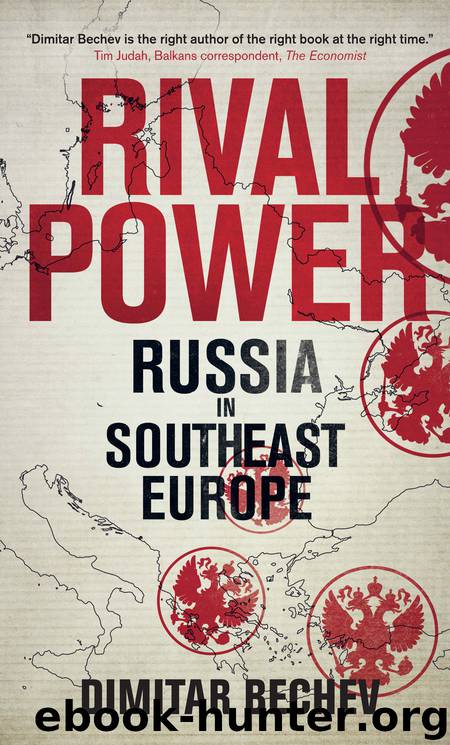Rival Power: Russia in Southeast Europe by Dimitar Bechev

Author:Dimitar Bechev [Bechev, Dimitar]
Language: eng
Format: epub
ISBN: 9780300219135
Google: FpYuDwAAQBAJ
Amazon: 030021913X
Publisher: Yale University Press
Published: 2017-01-15T00:39:31.754000+00:00
“Our strategic neighbor”
What conditioned the Russian–Turkish alignment, unprecedented since the interwar years, were ultimately shifts in the area of security. The Iraq War (2003–11) was a case in point. In a surprising move, Turkey decided not to join the American-led coalition of the willing and open a second front against Saddam Hussein from the north, as in the 1991 Gulf War. The drive for greater autonomy in foreign policy encouraged Moscow to look to Ankara as a potential ally to offset American unilateralism. It clearly had Turkish public opinion on its side. A majority opposed the war and viewed with suspicion George W. Bush’s post-9/11 war on terror. Fears of the knock-on effects of Iraqi Kurdistan’s advancement to full independence pervaded large swathes of society. The Turkish government, on the other hand, weighed up its options. The Turkish prime minister, Abdullah Gül,50 haggled hard with the United States, demanding monetary compensation and/or guarantees for Turkey’s presence in post-Saddam Iraq. Many expected Turkey, begrudgingly, to jump on the American bandwagon. Yet a group of AKP parliamentarians rebelled and, on 1 March 2003, defeated by a narrow margin the motion for joining the U.S.-led coalition. In other words, Turkey and Russia ended up on the same side of the barricade thanks to a contingency. But that did not alter the fact that there was a confluence of views in Moscow and Ankara. What mattered were the consequences. The state with the second largest military in NATO had stood up to the all-powerful United States. The Putin–Erdoğan summitry, kicking off not long after the invasion of Iraq, was a reflection rather than the cause of the rapprochement.
The Turks and Russians agreed that they could manage their common frontier. In early 2001, Moscow had joined the Black Sea Force (BLACKSEAFOR) delegated to take charge of naval security—discharging tasks such as search-and-rescue and maritime policing. Touted as a contribution to the global war on terror, BLACKSEAFOR kept its distance from NATO and excluded the United States. More than that, Turkey opposed the extension of the Atlantic Alliance’s Operation Active Endeavor from the Mediterranean to the Black Sea. As an alternative, in the spring of 2004, Moscow and Ankara launched a BLACKSEAFOR operation, Black Sea Harmony, tasked with intercepting terrorists and traffickers of arms and drugs. The Black Sea area would be a Russian–Turkish shared responsibility—or even a condominium. Yet Turkey had to strike a delicate balance. Its diplomats worked hard to convince the Americans that Black Sea Harmony was an incremental step, and not an impediment, to NATO’s involvement.51 When America applied to become an observer in the BSEC, the economic leg of Black Sea regionalism, Turkey abstained and Russia’s response was a resounding “nyet.”52
The 2008 war in Georgia showed how deeply entrenched Russian–Turkish security co-operation had become. Georgia was no ordinary neighbor. In the early 1990s, when Turkey was at loggerheads with most countries around its borders, amicable links with Tbilisi were a welcome exception. Georgia served as a bridge to the Azeris and the Caspian Sea and was key to the BTC while Turkey topped the list of its trading partners.
Download
This site does not store any files on its server. We only index and link to content provided by other sites. Please contact the content providers to delete copyright contents if any and email us, we'll remove relevant links or contents immediately.
| Arms Control | Diplomacy |
| Security | Trades & Tariffs |
| Treaties | African |
| Asian | Australian & Oceanian |
| Canadian | Caribbean & Latin American |
| European | Middle Eastern |
| Russian & Former Soviet Union |
The Secret History by Donna Tartt(16684)
The Social Justice Warrior Handbook by Lisa De Pasquale(11499)
Thirteen Reasons Why by Jay Asher(7814)
This Is How You Lose Her by Junot Diaz(5808)
Weapons of Math Destruction by Cathy O'Neil(5061)
Zero to One by Peter Thiel(4841)
The Myth of the Strong Leader by Archie Brown(4798)
Promise Me, Dad by Joe Biden(4463)
Beartown by Fredrik Backman(4448)
How Democracies Die by Steven Levitsky & Daniel Ziblatt(4434)
Stone's Rules by Roger Stone(4427)
The Fire Next Time by James Baldwin(4357)
100 Deadly Skills by Clint Emerson(4095)
A Higher Loyalty: Truth, Lies, and Leadership by James Comey(4046)
Rise and Kill First by Ronen Bergman(4029)
The David Icke Guide to the Global Conspiracy (and how to end it) by David Icke(3900)
The Farm by Tom Rob Smith(3884)
Secrecy World by Jake Bernstein(3794)
The Doomsday Machine by Daniel Ellsberg(3743)
